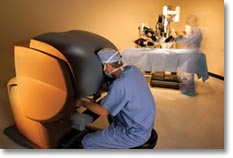A radical prostatectomy is a surgical procedure to remove cancer that has not spread beyond the prostate. CyberKnife may provide patients a non-surgical alternative to a radical prostatectomy.
| CyberKnife Radiosurgery |
No incision - delivers radiation like brachytherapy from outside the body to treat cancer inside the body |
| Radical Prostatectomy |
Surgery (may not be appropriate for patients of advanced age or those with multiple medical conditions); may be traditional surgery or less invasive surgery using da Vinci Surgical System |
| |
Hospitaly Stay |
Anethesia |
| CyberKnife Radiosurgery |
Outpatient treatment - no hospital stay |
No anesthesia |
| Radical Prostatectomy |
Hospital stay |
General anesthesia |
| CyberKnife Radiosurgery |
Sub-millimeter accuracy that protects surrounding structures and tissues |
| Radical Prostatectomy |
Removes the entire prostate while trying to spare muscles and nerves that control urination and sexual function |
| CyberKnife Radiosurgery |
No recovery time; patient quickly resumes normal activities |
| Radical Prostatectomy |
Pain associated with surgery; post-operative recovery time; erectile dysfunction; radiation therapy may be required after surgery |
| CyberKnife Radiosurgery |
Research at the Seattle Cyberknife Center and elsewhere are showing excellent PSA responses and low rates of recurrence. Longer follow-up is needed to confirm these findings. |
| Radical Prostatectomy |
High cure/survival rates in favorable-risk patients |






 A radical prostatectomy is a surgical treatment for cancer that has not spread beyond the prostate. The patient may be under general or spinal anesthesia. The surgeon removes the prostate and possibly the lymph nodes while trying to spare the nerves that would affect erectile functions. Because the surgeon must cut the urethra, which runs through the center of the prostate gland, and reattach it after removing the prostate, the patient will have a catheter for several days. The patient typically will remain in the hospital for 2-4 days, and will have a recovery time of about 12 weeks.
A radical prostatectomy is a surgical treatment for cancer that has not spread beyond the prostate. The patient may be under general or spinal anesthesia. The surgeon removes the prostate and possibly the lymph nodes while trying to spare the nerves that would affect erectile functions. Because the surgeon must cut the urethra, which runs through the center of the prostate gland, and reattach it after removing the prostate, the patient will have a catheter for several days. The patient typically will remain in the hospital for 2-4 days, and will have a recovery time of about 12 weeks.